Virginia Crow's Blog: Crowvus Book Blog, page 9
November 13, 2024
A Pact Fulfilled - Eleanor Swift-Hook - Qs&As
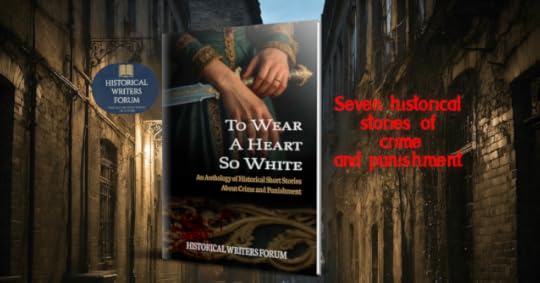
For today's #HistFicThursdays blog, I'm delighted to be welcoming Eleanor Swift-Hook onto the Crowvus blog, to talk about her story, A Pact Fulfilled, which is included in To Wear A Heart So White, the new Historical Writers Forum anthology. Read on to hear all about her inspiration, writing real people, and the importance of research...
First of all, can you please tell us about yourself and your writing?
According to my mother I’ve been writing stories ever since I first learned how to form words with a pencil. In those days I even illustrated them as well, but sadly my artistic talent did not keep pace with my literary enthusiasm.
Although I have written other things, I started writing historical fiction relatively recently, driven by my passion for the early modern period, especially the tumultuous times in the 17th century. My Lord’s Legacy series of books is set in the First English Civil War, one of the Wars of the Three Kingdoms, and my latest series explores the grim events of the Thirty Years War.
In relation to A Pact Fulfilled, where did your inspiration come from?
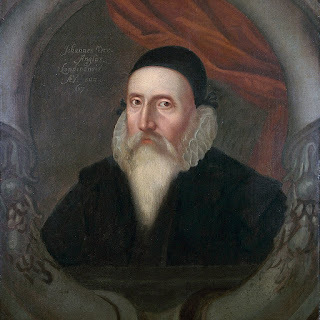 The man himself - John Dee
The man himself - John DeeThat story was inspired by research into the life of John Dee who is a huge influence on both my Lord’s Learning and Lord’s Legacy series, although they are set decades after his death. He and some of the key figures in his life cast long shadows across the years and a couple even appear in my books. As a part of my research for Lord’s Legacy I read his spiritual diaries - or as much as I could access as I am no Latin scholar. It was there I found the story behind A Pact Fulfilled - indeed the title is taken from a line in the diary and is a translation of it: ‘pactum factum’.
What are the pros and cons of writing about real people?
The problem with historical fiction based on real people is that history itself is usually a spoiler! One has to write with the awareness that your audience might already know the end of the story, which is why I prefer in general to write about fictional characters in a historical setting as then the outcome is not a given.
The pros are that you often have a lot about them and their life story to give impetus and structure to your own. But that can also be a downside when it restricts what you can plausibly write about them. That said, I believe that as long as one is not writing something utterly against what is known about a historical character, fictional works should feel free to speculate as it suits the plot. I always point to the great Dorothy Dunnett who turned Margret Douglas into an utterly despicable individual in order to provide the antagonist she needed, whereas history suggests the poor woman was nothing like as nasty. But then unlike biographies or history books, historical fiction has the implicit leeway to interpret a historical character as suits the author best for the purposes of their story.
The author’s note explains where a lot of your research came from, but was there anything you uncovered which really surprised you?
I think what surprised me about John Dee is how such an apparently astute man could have fallen for a confidence trickster like Edward Kelley. To a modern reader of the diary it is so obvious what is going on, but Dee himself was seemingly oblivious and had faith that Kelley really was communicating with angelic beings. Right up to the end of their relationship, which was imposed by Kelley not Dee, John Dee had faith in his scrying.
Kelley must have been incredibly intelligent. He even invented a language for the angels - perhaps during his long absence from Mortlake before they left for Europe when he was supposedly treasure hunting. One can understand the frustration of being a man of intelligence and having no way to progress within a society that was largely set against social mobility. For all his faults, he certainly did his best to ensure his step family had a good education and thus every opportunity in life.
While the story is told from Jane’s perspective, there are a number of sympathetic characters in it. Did you have a personal favourite among them?
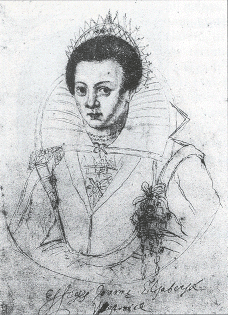 Kelley's step-daughter,
Kelley's step-daughter,Elizabeth Weston
Jane herself is undoubtedly my favourite. She was born Jane Fromond and had been a lady in waiting to the Countess of Lincoln before she married John. There are many references to her in Dee’s diaries and one gets the impression of a very strong individual: a woman who can manage to travel with two young children whilst pregnant with a third, face near shipwreck and the perils of journeying across 16th Century Europe, often alone as there were several times she was separated from her husband. She is someone I can admire.
But I also think it is hard not to have a lot of sympathy for Kelley’s wife, Joanna. Kelley was a man given to violent outbursts and cannot have been easy to live with. She was very loyal to him though, up to the end of his life she was trying to petition the emperor on his behalf.
And no parent can fail to feel for young Arthur, desperately trying to live up to what his father asked of him. The experience impacted him profoundly because until he died in 1650 he believed in the power of alchemy and the truth of what his father had been doing.
Without giving too much away(!), there is a clear protagonist and antagonist. What do you think are the benefits and disadvantages of writing crime stories in this way?
There is in all of us a desire for simplicity, for good and evil to be clearly labelled and easily defined. But real life is seldom like that. The vast majority of people are shades of grey. Very often one perspective’s antagonist might be another perspective’s protagonist. The benefit in exploring that makes for far more complex and interesting characters. The antagonist can even be quite a sympathetic person despite committing whatever crime. That kind of deeper characterisation is something I enjoy doing so in all my writing where I can. The disadvantage is it takes page time to properly characterise such an antagonist, to show the subtlety of how they are who they are, and not every story can allow for that.
Also sometimes the focus of the story is on the experience of one character told exclusively through their perception. Then someone that character views as an antagonist is cast in sharp relief as being so. If we dislike someone we seldom see their good points. However, that antagonist might appear very differently if the story was being told by a different character.
And finally, what’s next for you and your writing?
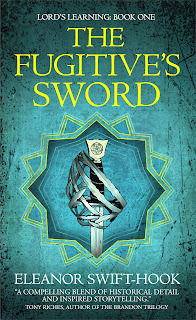 I have just brought out The Fugitive’s Sword, the first volume in a new Seventeenth Century historical fiction series Lord’s learning. It is set in 1624, 400 years ago this autumn, and has as its backdrop the tumultuous events that were going on in Europe as what would become the Thirty Years War got underway. The book traces the early experiences of Philip Lord, the hero of my already published Lord’s Legacy series, and follows him through adventures on land as a mercenary and a spy, and at sea as a Dunkirker pirate. At the moment I am working on preparing the second book, The Soldier’s Stand, for publication and it will be out next year.
I have just brought out The Fugitive’s Sword, the first volume in a new Seventeenth Century historical fiction series Lord’s learning. It is set in 1624, 400 years ago this autumn, and has as its backdrop the tumultuous events that were going on in Europe as what would become the Thirty Years War got underway. The book traces the early experiences of Philip Lord, the hero of my already published Lord’s Legacy series, and follows him through adventures on land as a mercenary and a spy, and at sea as a Dunkirker pirate. At the moment I am working on preparing the second book, The Soldier’s Stand, for publication and it will be out next year.To Wear a Heart So White is available here on #KindleUnlimited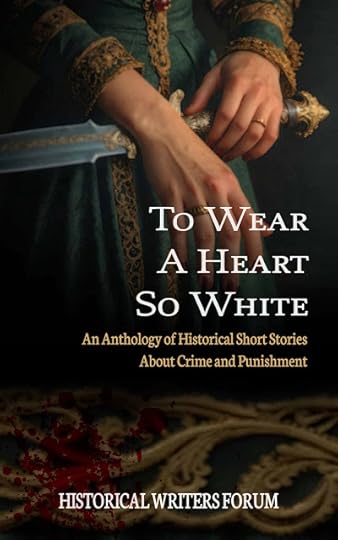
So let's meet the book...
A cost for every action, and a price for every deed.
The Historical Writers’ Forum proudly presents seven stories of Crime and Punishment, from across the ages. From an anchoress to a war hero; from Italy to Missouri; this anthology has a story for everyone.
Included stories are:
The Ignoble Defence - Virginia Crow
Agatha’s Eyes - Rachel Aanstad
A Pact Fulfilled - Eleanor Swift-Hook
Carte de Viste - Ronan Beckman
A Dish Served Cold - Brenda W. Clough
Shadows of the Adriatic - Tessa Floreano
A Dangerous Road - D. Apple
Now, lets meet the author...
 Eleanor Swift-Hook
Eleanor Swift-HookEleanor Swift-Hook enjoys the mysteries of history and fell in love with the early Stuart era at university when she re-enacted battles and living history events with the English Civil War Society. Since then, she has had an ongoing fascination with the social, military and political events that unfolded during the Thirty Years’ War and the Wars of the Three Kingdoms. She lives in County Durham and loves writing stories woven into the historical backdrop of those dramatic times.
Her six-book series, Lord’s Legacy, traces the story of Philip Lord, a mercenary commander with a reputation for ruthlessness gained in the wars raging across Europe, who has returned to England at the opening of what will become the First English Civil War. But he returns with a treason charge hanging over his head and in search of his identity and heritage. The truth about that lies in the hands of a mysterious cabal calling itself the Covenant, and their secret conspiracy which began a century before.
The story is largely told through the eyes of Gideon Lennox, a young London lawyer who has some growing up to do. He is honest, and intelligent, struggling with the changing reality as war overthrows the things he values. His worldview is broken apart and remoulded by the extraordinary people he is thrust into contact with and the demands made on him.
You can learn more about Eleanor and her books on her website: eleanorswifthook.com
November 12, 2024
Agatha's Eyes - Rachel Aanstad - Qs&As
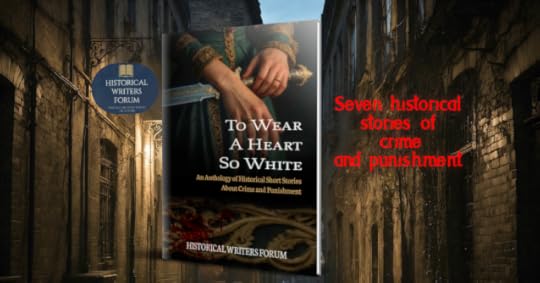
Today is the first day in a series of interviews for the stories of the Historical Writers Forum anthology, To Wear a Heart So White. Our first interview is with Rachel Aanstad who is the author of the story, Agatha's Eyes. So let's meet Rachel and hear more about her story...
First of all, can you please tell us about yourself and your writing?
I’ve been fascinated by history since I was a little girl. My playtimes always involved pretending I was something like a priestess in Ancient Egypt or a Lady in Waiting at Queen Elizabeth I court. I was always interested in the lives of people who weren’t monarchs or wildly famous.
Over the years I have been lucky to be able to explore a variety of careers. I worked as a radio DJ, a bookkeeper, an architect, an illustrator, a set designer, a Shakespeare director, a gardener, a teacher, a writer, and a medicinal herbalist. I have lived all over the US and traveled in Asia. All of these experiences have helped me be a better writer. These days I’m a happy homebody and I focus on research and writing.
In relation to Agatha’s Eyes, where did your inspiration come from?
Well, this is a little personal but I’m currently dealing with health issues that require me to be home in bed most of the time. I was researching the ecclesiastical roles of women in the Middle Ages and learned about the lives of anchoresses. These were women who became attached to a specific parish church and never left. They become a living anchor for their community that tied the physical world to the divine.
Given my current circumstances I found it very easy to imagine myself in that lifestyle. I love cozy mysteries but all those amateur sleuths are very active. They scurry all over town to solve crimes. I wondered if it was possible to write a mystery where the sleuth must rely completely on what she can learn from the confines of her own room. Would it be possible to solve a mystery without ever leaving your home?
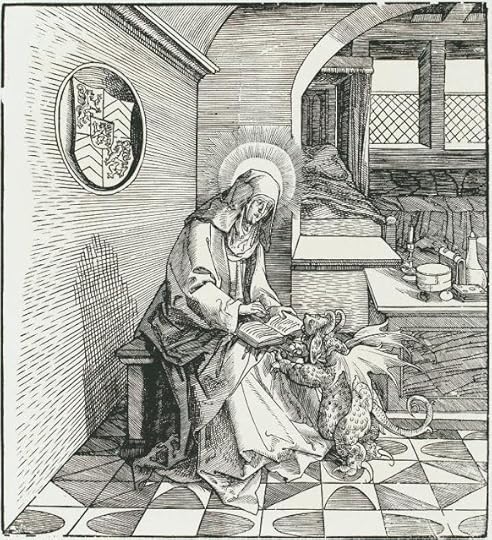 St. Madelberte, Abbess of Maubeuge, being tempted by a demon while in prayer,
St. Madelberte, Abbess of Maubeuge, being tempted by a demon while in prayer,from a woodcut by Leonhard Beck (1517-1519)
Agatha’s Eyes is very much Agatha’s account of events. What are the biggest pros and cons of writing in a limited point of view?
The cons were many given that Agatha can’t leave her abode. It was very tempting to change the point of view to one of the more mobile characters but I wanted the reader to feel Agatha’s challenges. It is frustrating to be stuck in one place while important things are happening elsewhere. At the end of the story I wanted the reader to enjoy the satisfaction that comes from surmounting those limitations.
There’s clearly a lot of research gone into this story. Did you come across a particularly fabulous research gem?
Yes I am indebted to Dr. Justin Sledge and his YouTube channel Esoterica. He provides entertaining and historically rigorous lectures on a variety of faith-based and esoteric traditions. He has a wonderful series on female mystics that was very inspiring.
There are a lot of very different characters in this story. Was there a particular one which you liked or disliked? Why?
I was very fond of the gossipy Goodwife Applebottom. If there are future instalments of Agatha’s adventures the next story will probably focus on the goodwife and her many trials and tribulations.
Agatha’s Eyes has a very satisfactory ending – how important do you think it is to have closure at the end of a piece of crime writing?
I think for a cozy mystery a satisfying ending is essential. As writers we are asking the reader to go on a ride with us. They have no idea where we are taking them and they are entrusting us to make their time with us worthwhile. I want my readers to feel that their time was well spent and to feel empowered to surmount frustrating and scary situations in their own lives.
And finally, what’s next for you and your writing?
I’m currently writing a non-fiction book called Shakespeare’s Influences for Pen and Sword. This is my third book about Shakespeare’s plays. The other two are called A Midsummer Night's Dream Illustrated Handbook and Encyclopedia and A Bawdy Twelfth Night or What You Will Encyclopedia & Dramaturgical Handbook.
To Wear a Heart So White is available here on #KindleUnlimited
So let's meet the book...
A cost for every action, and a price for every deed.
The Historical Writers’ Forum proudly presents seven stories of Crime and Punishment, from across the ages. From an anchoress to a war hero; from Italy to Missouri; this anthology has a story for everyone.
Included stories are:
The Ignoble Defence - Virginia Crow
Agatha’s Eyes - Rachel Aanstad
A Pact Fulfilled - Eleanor Swift-Hook
Carte de Viste - Ronan Beckman
A Dish Served Cold - Brenda W. Clough
Shadows of the Adriatic - Tessa Floreano
A Dangerous Road - D. Apple
Now, lets meet the author...
Rachel Aanstad
R. K. Aanstad is a writer, artist, and historian. She lives in the Pacific Northwest surrounded by books, cats, and silly little dogs. She has a dollhouse kit company called Tilly Valley Miniatures and writes books about Shakespeare’s plays. She is currently writing Shakespeare’s Influences for Pen and Sword to be published in 2025.
November 7, 2024
#HistFicThursdays - The Fishwife's Lullaby - Free Poem
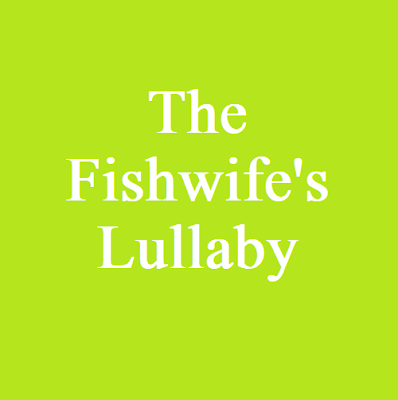
During November, the Scottish reading and writing community come together for Book Week Scotland. This week-long, themed event is designed to break barriers and promote a love of books and reading for all. This year's theme is Hope, and I encourage all of you - whether you are in Scotland or not - to keep up with and enjoy the events which are happening (quite a few are online). This year, Book Week Scotland is 18th-24th November.
So, in the spirit of community and hope, here is a little poem I wrote about a mother rocking her child to sleep. It embodies the fears and hopes of the historical communities of Orkney, where I grew up, and Caithness, where I live now. In a time before mobile phones or satellite weather forecasting, hope was the only connection those on land had with their loved ones on the sea.
The Fishwife’s LullabyHush…Father’s boat will soon be mooring.You shall see him in the morningWhen tide returns him home.
Sleep…Time for thoughts and dreams of glory.Time to drift to realms of storyWhere gallant deeds are done.
Rest…Do not heed the wind’s load roaring Nor the shrieks of gulls that, soaringOn night’s wings, fill the air.
Peace…Have no fear, though breaking waves crash,And the snarling, heaving, sprays lashAgainst the harbour walls.
Calm…Noises poison minds at midnight,Things we see without our eyesightLay traps and catch us there.
Hush…Father’s boat will soon be mooring.We shall see him in the morning.Pray tide returns him home.
November 4, 2024
To Wear a Heart So White - Inspiration behind "The Ignoble Defence"
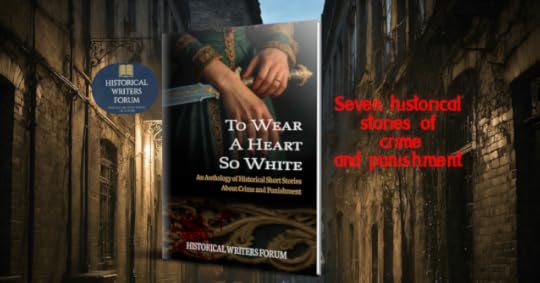
There is an unwritten rule in archaeology that, if there is an exciting find which you have no idea what it is, you speculate that it had a ritual purpose. As a non-archaeologist I don't know how true this is, but both my siblings who are archaeologist have told me this is the case. I think this is always at the back of my mind when I look through my research as a historian.
So, when I was flicking through unsolved mysterious deaths and came across the circumstances surrounding the Bocksten Man, I had in my head the idea that the unsolved details were due to ritualistic behaviour. And, to be honest, he did meet a rather unusually brutal death.
Allow me to introduce him...
The Bocksten Man was unearthed in 1936, still with the oak stave which had been used to impale him into the bottom of the lake. He was fully clothed, supposedly wearing wool from head to toe which denoted a certain amount of wealth. Unlike most of the bog bodies from the area, the Bocksten Man had not been killed that long ago, only in the 14th Century.
All in, the facts point to an impromptu execution, with a substantial argument that the Bocksten Man was involved in witchcraft or some form of criminal activity. But if he had been innocent, what would have led to him ending his life pinned face-down in the boggy lake? Why was he hidden with such great care that he should never resurface? It was time someone wrote the possibility of him as the victim (which he certainly was, one way or another). The Ignoble Defence was the result of my take on this possible scenario.
It is a story of a fear-induced crime and a knee-jerk punishment.
If you'd like to know more about the Bocksten Man, check out Hallands Kulturhistoriska Museum's page about him here.
The Ignoble Defence is included in the Historical Writers Forum's anthology To Wear a Heart So White...
A cost for every action, and a price for every deed.
The Historical Writers’ Forum proudly presents seven stories of Crime and Punishment, from across the ages. From an anchoress to a war hero; from Italy to Missouri; this anthology has a story for everyone.
Included stories are:
The Ignoble Defence - Virginia Crow
Agatha’s Eyes - Rachel Aanstad
A Pact Fulfilled - Eleanor Swift-Hook
Carte de Viste - Ronan Beckman
A Dish Served Cold - Brenda W. Clough
Shadows of the Adriatic - Tessa Floreano
A Dangerous Road - D. Apple
To Wear a Heart So White is available here on #KindleUnlimited
October 31, 2024
NEW RELEASE - Introducing "To Wear a Heart So White"
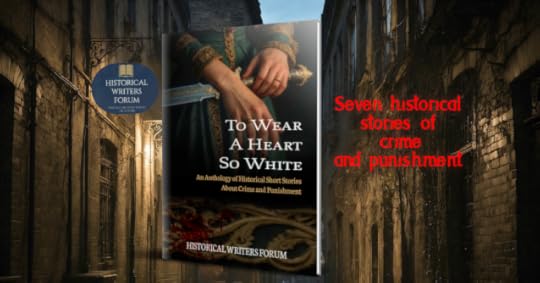
It is an absolute delight to announce the launch of To Wear a Heart So White: An Anthology of Historical Short Stories About Crime and Punishment. Seven stories, spanning almost eight hundred years, take readers on a journey into the crimes of yesteryear and the punishments they evoked. These stories come from the writers of the Historical Writers' Forum, and include a broad range of subgenres and styles, including a story for everyone.
So let's meet the book...
A cost for every action, and a price for every deed.
The Historical Writers’ Forum proudly presents seven stories of Crime and Punishment, from across the ages. From an anchoress to a war hero; from Italy to Missouri; this anthology has a story for everyone.
Included stories are:
The Ignoble Defence - Virginia Crow
Agatha’s Eyes - Rachel Aanstad
A Pact Fulfilled - Eleanor Swift-Hook
Carte de Viste - Ronan Beckman
A Dish Served Cold - Brenda W. Clough
Shadows of the Adriatic - Tessa Floreano
A Dangerous Road - D. Apple
To Wear a Heart So White is available here on #KindleUnlimited
Now, lets meet the authors...
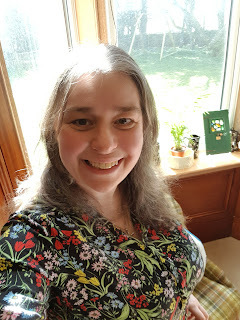 Virginia Crow
Virginia CrowVirginia Crow is an award-winning author of historical fiction. Her writing borders on the edge of reality, challenging the beliefs and superstitions of bygone days.
She lives in Caithness, where her life is dictated by Orlando and Jess, her two spaniels.
Rachel Aanstad
R. K. Aanstad is a writer, artist, and historian. She lives in the Pacific Northwest surrounded by books, cats, and silly little dogs. She has a dollhouse kit company called Tilly Valley Miniatures and writes books about Shakespeare’s plays. She is currently writing Shakespeare’s Influences for Pen and Sword to be published in 2025.
 Eleanor Swift-Hook
Eleanor Swift-HookEleanor Swift-Hook enjoys the mysteries of history and fell in love with the early Stuart era at university when she re-enacted battles and living history events with the English Civil War Society. Since then, she has had an ongoing fascination with the social, military and political events that unfolded during the Thirty Years’ War and the Wars of the Three Kingdoms. She lives in County Durham and loves writing stories woven into the historical backdrop of those dramatic times.
Her six-book series, Lord’s Legacy, traces the story of Philip Lord, a mercenary commander with a reputation for ruthlessness gained in the wars raging across Europe, who has returned to England at the opening of what will become the First English Civil War. But he returns with a treason charge hanging over his head and in search of his identity and heritage. The truth about that lies in the hands of a mysterious cabal calling itself the Covenant, and their secret conspiracy which began a century before.
The story is largely told through the eyes of Gideon Lennox, a young London lawyer who has some growing up to do. He is honest, and intelligent, struggling with the changing reality as war overthrows the things he values. His worldview is broken apart and remoulded by the extraordinary people he is thrust into contact with and the demands made on him.
You can learn more about Eleanor and her books on her website: eleanorswifthook.com
 Ronan Beckman
Ronan BeckmanRonan Beckman is a retired American educator who has lived in the UK for over 30 years. He often writes historical fiction based on the lives of real people that he has discovered through his genealogical studies of the family tree. The character of Sergeant Sven Stenander is the story of Ronan’s great-great-great grandfather. Many of the events in Sven’s colourful life were outlined in a poem written in Swedish that was handed down by a distant cousin, and several news articles that Ronan discovered in his research.
Brenda W. Clough
Brenda W. Clough is the first female Asian-American SF writer, first appearing in print in 1984. Her latest work is a novelette, ‘Clio’s Scroll’, which appeared in Clarkesworld in July 2023. A historical novel A Door In His Head won the 2023 Diverse Voices Award. Her novella ‘May Be Some Time’ was a finalist for both the Hugo and the Nebula awards and became the novel Revise the World. Marian Halcombe, a series of eleven neo-Victorian thrillers appeared in 2021.
Her complete bibliography is up on her webpage brendaclough.net
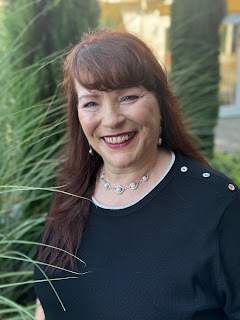 Tessa Floreano
Tessa FloreanoTessa Floreano writes historical tales about Italians—by moonlight or candlelight—set in Europe and the Pacific Northwest.
Her first romantic mystery, SLAIN OVER SPUMONI, set in post-WWI near Venice, was published summer of 2022 and won First Place in the Novella category by the Chanticleer International Book Awards. Her debut nonfiction book, ITALIANS IN THE PACIFIC NORTHWEST, about early settlers in Idaho, Oregon, and Washington from 1880 to 1950, was published in fall 2023. It is a Finalist for a Nellie Bly Award for Journalistic Nonfiction by Chanticleer International Book Awards.
Every few weeks on her Substack, she posts in-depth stories about Italian Americans and Italian Canadians in the Pacific Northwest. There’s a project in the works over the next several years to create both a documentary as well as a traveling exhibit based on her nonfiction book and work as a community historian of Italians in the Pacific Northwest.
Her next romantic mystery, set in northern Italy in 1899 in a castle at Christmas—involving matrimony, murder, and mayhem—will be published in the fall of 2024.
Visit her website and sign up for Tramblings, her occasional newsletter, to get all the latest on her writing www.tessafloreano.com/newsletter
D. Apple
When she’s not pursuing research bunny trails, Danielle is reading. Her happy place is cozying up on the couch with her dog and a 19th-century gothic mystery novel, but you’ll also find her hiking and exploring ghost towns and forgotten graveyards. An avid photographer and language learner, Danielle finds it difficult not to see the story potential in every place or turn of phrase. Sometimes the muses are humorous, and sometimes they are dark, but they always come from an integral place.
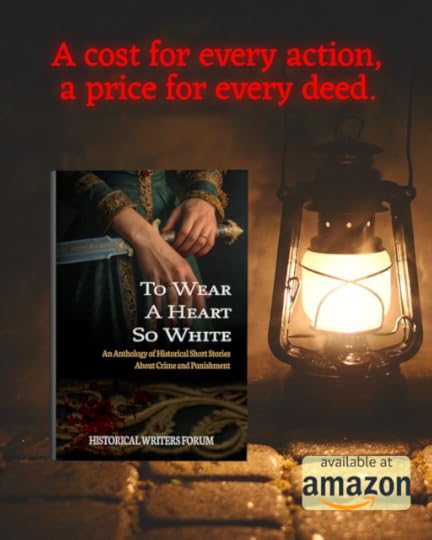
#HistFicThursdays - Things to Inspire - Mirror
I know I've posted a couple of times already about this object, but today I'm adding an extra slant to it, exploring the myths and stories of mirrors and the supernatural.
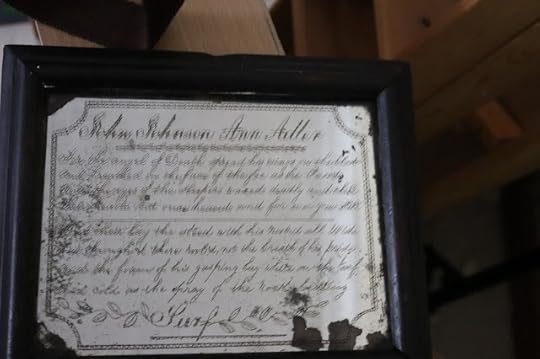
If you would like to read about how I came by the mirror in the first place, have a look at this blog. I've wondered multiple times if this object was a great big hoax - certainly, there seems to be nothing about John and Ann anywhere - but it almost doesn't matter. The wood, the nails and the glass itself are all of a decent age, and there is no impossibility in the eyes of a writer.
Recently, I was struck by how much light the stained and marked surface produces. One night, on a near-full moon, it was enough to throw a long stretch of light about twenty times its own size across the room. It must have seemed equally frightening and enthralling for people in the past, that this flat, cold surface could redirect not only light but heat.
But mirrors were not readily available for many people until very recently (in terms of history!). While mirrors were used by the Ancient Egyptians as cunning ways of allowing light deep into buildings, a system which was perfected around 3,000BC, the earliest known use of a mirror as an object - that is not just using water like Galadriel! - was 3,000 years earlier in modern-day Turkey. These were made from dark materials which were extensively polished.
It was the Ancient Greeks (no surprises there!) who perfected the mirror as a means of admiring themselves, an art perfected by the Romans, and built upon by many other peoples since. But mirrors were still far from commonplace. It was not until the 15th/16th centuries that glass mirrors began to be commercially produced, the centre for this being Venice. Then, the industry boomed, and mirrors became a must-have for all homes able to support one. It took a further century before French artisans took the practice to England.
By now, the mirror had come a long way. It had gone from being a sacred albeit practical tool, to being about extravagant design and status. But, until the invention of the electric light, mirrors were still used carefully, hung in areas which would best reflect daylight or candlelight into the rest of a room. Check your timeline carefully, writers! I got pulled up by my editor on trying to give Edith a mirror in The Year We Lived but it was something I knew existed in the ancient past but had never considered how long it took for mirrors as we would recognise them to reach England
So, when we can trace their history through to the mundane, why are mirrors so closely linked to the paranormal?
Well, firstly, they lie. When you lift your right hand, it is your reflection's left hand which moves. In this way, it's easy to see how people believed they were seeing another version of themselves. Furthermore, they move, which can give all sorts of illusions to the person standing still before it. They mist up and are easily impacted by human breath. Some things are not as clearly visible in them as others, creating a distorted yet recognisable world: they give you everything you know, but only some things you recognise.
There is little wonder then that mirrors became linked to the supernatural. It was believed that an infinity mirror (a setup of mirrors which reflect one another) would steal the soul of any who looked into them, trapping it in the endless cycle. On Halloween night, girls would brush their hair before a mirror in the hope that the reflection of their future husband would appear. And let's not forget the Mirror, Mirror, on the wall which the Brothers Grimm immortalised. I love the scene in Gaston Leroux's The Phantom of the Opera, when Raoul is trapped in the mirror room. The musical pays homage to it in a fleeting moment, but it does not capture the fear and desperation of the character in the book.
This evening, as the veil thins, challenge yourself to look in each mirror you pass, writers. Story up every image you see: the real; the distorted; the shadows which hide the unknown. Perhaps you'll feel too nervous to look in any, so capture that fear which drives you to look away. These observations and emotions are what bring your writing to life.
One thing is for sure: what you will see in the mirror may be an honest reflection, but it will not be what you see if you turn around.
October 23, 2024
#HistFicThursdays - My Mother’s Eyes to See, My Father’s Hand to Guide - Free Short Story
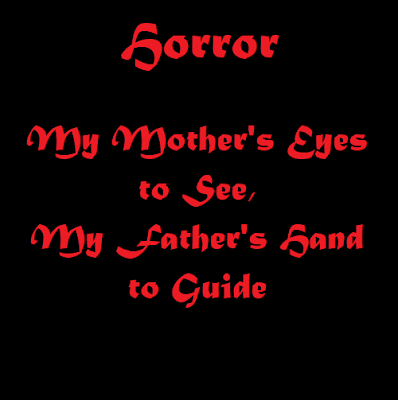
Here's a little historical horror story, right in time for Hallowe'en. This is based on the macabre belief in the power of a Hand of Glory and, while the story is fictitious, the events leading there were all true.
MyMother’s Eyes to See, My Father’s Hand to Guide
1596
106 Egiptians (gypsies) were condemned to death in York.
Only 9 were executed, the others able to prove their English birth.
The magistrate forced the children of the condemned to watch.
Cornella’seyes welled with tears as she struggled against the hand on her shoulder. Farfrom being alone, scores of people stood before her, but every one of them wasa stranger. She was standing on a high wall, the last in a line of youngsters.These children she did know. They were her fellow gypsy children.
Asecond hand rested on her other shoulder, pinning her firmly in place.
Thepeople below her were gathered as though at a fair. They talked excitedly,eagerly awaiting the spectacle. Cornella felt the grip of invisible, icyfingers tighten around her chest as they began laughing and jeering, a certainindication the condemned men and women were being led to the scaffold. Nine nooseshung there. One for each gypsy who was unable to prove their English ancestry.One for each parent whose children were being forced to watch.
Powerlessto struggle free from the hold of the city guardsman, Cornella screwed her eyesclosed so she would not have to witness her father’s and mother’s deaths. Shedid not need her vision to tell her when the rope had tightened, the sound fromthe crowd was indication enough. They revelled in the macabre display,celebrating the deaths of these gypsies, laughing and pointing at their finalspasms. Each suspended convict was accused of being naughty, idle, and ungodlybut, as Cornella opened her eyes and saw the crowd, she realised they were theones who were naughty, idle and ungodly. They were carrion monsters in humanform.
Cornella’sgaze rested on her parents as her breathing choked her. Her father’s faceseemed calm, as though he had expected nothing but this outcome, almost pleasedit had arrived. But her mother’s eyes stared out wildly, watching forever theworld from which she had been so brutally ripped. Frightened as much as she washorrified, Cornella took a step back, colliding with the guard behind her.
Thechildren were being led away, each shoved and gripped by one of the city guardswith a vehemency which spoke of mistrust and hatred. Several wept, but theywere afraid to make too much noise lest they would be forced to suffer the samefate as their parents. Cornella glared at the magistrate as, ignoring thechildren entirely, he addressed the guards who held them.
“Findthem somewhere to stay. If no one will take them, throw them back in thecastle.”
Theinstant she felt the grip on her shoulders loosen, Cornella slipped away,rushing to a pile of crates. She crouched low, waiting long enough to watch theguards round up the gypsy children and herd them away. None of them botheredcounting them. None of them cared. Rushing through the streets of York, sheducked in and out of snickleways until she became completely lost. Only thendid she lean against the wall of an overhanging building, desperately drawingin deep breaths, determined to overcome the desperation and terror which wassuffocating her. When she was able to regain her self-control, she glancedaround, uncertain where she was. Her one solace was that, if she had lostherself, she must surely have lost the magistrate too.
Withoutaim or direction, she wandered through the city until nightfall, afraid to restin case she was discovered. The streets became quiet as the sun went down, goodfolk staying indoors, but Cornella had nowhere to go. She stood in the shadowof the wall, where earlier she had been forced to bear witness to the brutalityof the bigoted law, and stared at the figures hanging from the scaffold.Tomorrow, having paid for their invented sins with their lives, they would beburied in the churchyard’s north side which was reserved for criminals andthose unshriven prior to death.
Shestood. And watched. And listened. Only when she was entirely convinced that shewould not be discovered did she stumble towards the bodies of her parents.Lifting her hand and placing it on her father’s bare foot, she reached to dothe same to her mother, but the rageful intensity with which the corpse staredaccusingly down made her withdraw the gesture.
“Watchyour step, imbecile!” hissed a voice behind her, venom and scorn dripping fromeach consonant and drowning every vowel. “There are only a few more minutesbefore the city guard return.”
“Whoare you?” Cornella asked, staring into the scarred face which sneered down.
“Ineed this one’s eyes and this one’s hand,” he announced, flicking a broad knifeblade towards her mother and father. “If you squeal, you will join them.”
Cornellastepped backwards as he turned his knife on her. Her mother’s lifeless legswrapped around her, and Cornella opened her mouth to scream. Without a moment’shesitation, the man slashed his weapon at her, slicing her palm as she tried tofend him off. She fell to the floor of the scaffold, staring up through wide,frightened eyes as he hacked at her father’s hand until he eventually succeededin severing it at the wrist.
“Theyare coming,” she sobbed, pointing her bleeding hand towards a side alley astorchlight spilled out.
Snatchingher arm, the man pulled her off the wooden boards and pushed her into the spacebelow the scaffold. She tried to breathe but his hand was gripped over hermouth, silencing her. They both watched as the four guards failed to notice themutilated body and continued their walk down another of the city streets whosedarkened mouth yawned onto the open square.
“Whydid you warn me?” demanded her captor, sliding his blood-soaked hand from herface. “You could have let them take me.”
“Whydid you do that to my father?” she wept in return. “Let the dead rest. He willcome after you, looking for what you stole from him.”
“No.He will serve me. His hand will bring me glory.”
Cornellawatched as he scuttled from their hiding place before she crawled after him.Hastily, he wrapped the severed hand in a cloth then mounted the scaffold oncemore to remove her mother’s eyes. She threw herself at him as he attempted tocomplete the macabre act.
“Whatare you doing?” she wailed, fighting against him. Her thin hands were clenchedinto fists, repeatedly striking him as his fingers reached towards her mother’scadaverous face. But her feeble blows were no match for this man, and he pushedher aside. She slipped from the wooden surface and crashed to the ground. Aboveher, she could see stars: tiny pinpricks of intense white, which danced andflickered for a moment. There were more than normal and, at once, they lungedtowards her, consuming her with their brilliance.
Sheawoke to the sound of rhythmic footfalls. The guards were returning on theirrounds. There was no trace of the other man, but the cut across her palm andthe deformed bodies of her parents were sufficient confirmation of how real herassailant had been. She dragged herself to the concealment of the scaffold,desperately trying to avoid the sight of her parents, and crouched there,waiting until the guards had passed through the square once more. Bathing inher own tears, she scrubbed the blood from her face and crept out into thenight.
Ithad been foolishness which had driven her back to the square, and the terriblesight before her made her realise at what a dear price it had come. But she hadreturned to her parents for a purpose, and now she swore it to them. Calling onnames her parents had threatened her with, Cornella swore to avenge them. Hadshe been only one year older she would have swung beside them. But, instead,she would be able to harvest her own form of retribution from the magistrate.She would find where he lived and she would kill him, making his own childrenwatch as she had been forced to witness her parents’ execution.
Overseveral days, Cornella sought for the magistrate. A man of such wealth and rankwas frequently to be seen in the city but, having found him protected andshadowed by the city guardsmen, it took a further number of days to learn wherehe lived. However, when she had become more confident in her determination, sheuncovered the location of his opulent brick house. It looked exactly as she hadimagined it: ostentatious and grand, but with a scornful expression in itsglass eyes, and steps leading up to it which looked like clenched teeth. It wasas repulsive as its master. Waiting until the evening darkened, she threadedher thin form through a tiny gap in the garden wall and crept towards the door.
“Goodevening.”
“Goodevening?” Cornella whispered in return, uncertain whether or not this youngvoice was addressing her.
“Whoare you?” A girl only her own age dropped out of the branches of a lime tree,straightening the skirts of a beautiful dress as she landed.
“Whoare you?”
“Ilive here, so I am permitted the right to ask all the questions. I’m Emma.”
“Myname is Cornella. I was looking for help,” she lied, recognising the roundfeatures on this girl’s face from those she had seen on the magistrate. Withoutdoubt, this was one of his children. One of the children who would watch Cornellakill him.
“Whydo you need help?”
“Icut my hand.” She presented the wound which, despite the time which hadelapsed, still refused to heal. “I need something to bind it.”
“Youneed something to clean it first,” Emma pointed out. There was an assured toneof knowledge and confidence which clipped the girl’s words, but there was norepulsion or derision. Every word she spoke was an indisputable statement offact. “It is filthy. Come with me.”
Cornellablinked in surprise as the girl gripped her other hand with no concern for herdespised background. Emma marched her towards the house, entering by theservants’ door and justifying her reasons for doing this.
“Fatherwill not approve of my helping you. But, if you do not get this injury boundsoon, it will spread to your spleen. How ever did you come by it?”
“Myspleen?” Cornella repeated, choosing to ignore her question. “It is nowherenear my spleen.”
Emmaonly laughed, believing this to have been a joke. Guiding her onwards, theyentered the washroom where, without calling for any help, Emma began to cleanand bind Cornella’s hand. Cornella watched this through narrowing eyes but Emmaignored this reception of mistrust, explaining that her father had found her aposition in the infirmary.
“Inthe wicked days,” Emma explained with all seriousness, “I might have joined aconvent. But now we are free of papal rule, I can be a nurse.”
Oncethis treatment was concluded, Emma showed Cornella out of the house along thesame route they had taken to enter. They both avoided the servants, eager notto be seen. Emma appeared to find this game very entertaining, and herbehaviour did not sober until they reached the place in the garden where theyhad first met less than an hour earlier. As Cornella turned to leave, Emmasnatched her wrist.
“Willyou come again, Cornella? I have only younger brothers and they are dull andfoolish.”
“Ofcourse,” Cornella promised in return. The smile she offered to Emma was receivedas though it was genuine affection. In truth, however, Cornella was only amusedby how easy the magistrate’s daughter was making it for her to accomplish her goalof retribution.
Overthe following two weeks, Cornella visited the magistrate’s house most days. Duringthese visits, she began learning the layout of his house, discovering the doorwhich led directly into his study, and even trying to substantiate Emma’s storyabout a secret tunnel. It appeared the house had once belonged to the churchand had witnessed murder before, during the bloody dissolution of themonasteries. When her new friend had explained this, Cornella began tounderstand the expression of hatred she had witnessed on the features of the house.Perhaps it loathed its owner with an equal intensity as the young gypsy girldid, or perhaps Cornella only wished it so. According to Emma, the priest hadtried to escape along the tunnel, but the king’s men had sealed the entrancesand left him to starve there. Emma’s grandfather had been gifted the house asreward for his service in these events. Cornella soaked in all of Emma’s tales,looking for the weaknesses within them and preparing for the moment she wouldsecure justice for her parents.
Butthe more she learnt of Emma, the more she came to like her. The girl was nodifferent to herself in anything but birth. And she was lonely. They talkedabout everything, pleased to share conversations without the prejudice of theiradult counterparts. Cornella even admitted to being a gypsy and, after aninitial response of shocked horror, Emma began to find it exciting.
“Iwish I could introduce you to my father,” Emma said one night as she walkedCornella to the gap in the wall where she slipped in and out for theirmeetings.
Cornelladid not reply but considered how close she was to achieving her vengeance.
“Ihave an idea,” Emma continued, excitement in her voice as she remainedoblivious to the threat of the girl before her.
“What?”
“Youcould wear one of my gowns. And we could say you were Lady Cornella of Athens.”
“Whereis Athens?”
“InGreece. You have a Grecian colouring.” Emma laughed, allowing her idea to takeshape into an entire plan. “We will do it tomorrow. My father is hosting thegentlemen of the district. He will be so distracted by them, he will never spareyou a second thought beyond what I tell him.”
Vanityhad never played a part in Cornella’s life. Yet, as Emma suggested thisdeception, she wondered how she would look in a gown. Emma could not havefailed to notice she always appeared in the same clothes, stained and torn. Northat she carried a smell unique to herself. But perhaps, with enough diligencefrom Emma, she really could pass as a noblewoman.
Shearrived early the next morning, slipping into the garden and waiting for Emmabeside the lime tree. There was an eagerness to her thoughts, pressing in onher with their giddy excitement. Emma greeted her, leading Cornella through thehouse and up to her own room. The party which the magistrate was hosting forthe local gentry was not until the evening and, in the hours between Cornella’sarrival and her presentation before the magistrate, Emma was certain she couldturn her into a lady. Besides, Emma had told her that, while her father’sattentions were turned towards building his own illustrious alliances, he wouldonly be pleased his daughter had a companion to distract her.
Theyspent the morning cleaning Cornella, combing her hair, and carefully stylingit. In the afternoon they dressed her. Cornella loved it. She admired herselfin the glass as she tried on each one of the dresses. The laces had to bepulled to their tightest, for she was not as robustly built as Emma but, as shecaught sight of herself in a deep blue and white gown, she gasped. She hadnever seen herself as anything more than the filth to which society haddegraded her. But here she glowed with elegance and style.
“Father,”Emma began that evening, oblivious to the fact she was presenting themagistrate to his intended murderess. “This is Lady Cornella of Athens. She hasdonated a large sum of money to the infirmary.”
“Indeed,Lady Cornella,” he replied, bowing his head towards the gypsy while Cornellacurtsied as Emma had shown her. “Then we are grateful to you.”
Followingthis comment, he utterly ignored Cornella. The two girls were seated at theopposite end of the long table from him, and Emma was beside herself with howthey had fooled him. She continued to make comments about it throughout theevening, unaware of the thoughts which ran through Cornella’s mind.
Cornellastared at the knives on the table, willing herself to obtain the courage to useone as a weapon. Every time she stared at the magistrate, laughing, celebratinghis victories, and sending food, saliva, and words across the table as hereplied to his guests, she hated him enough to kill him. But whenever she felther hand on the knife’s handle, she glanced across at Emma and her resolveabated.
Itwas not until the meal was drawing to a close and the topic of the law wasraised, that the gentlemen thought twice about the young woman.
“Thiscurrent spate of robberies must be brought to an end,” one remarked, sittingback and looking at the nodding approval from the other men.
“Sixteenhouses in only a little more than the same number of days,” agreed anothergentleman. “And all of the victims simply slept through it.”
“It’smagic. Those gypsies, mark my words. They should never have been spared.”
“Accordingto the law of the land, they had to be offered the chance to leave if they wereborn here,” Emma’s father explained.
“Andthis is how they repay you.”
“Areyou alright, Lady Cornella?” asked the first gentleman. “You look pale.”
“Cornella?”The magistrate repeated her name as though he was hearing it for the first timein the evening. “I know that name. You are not of Athens. You are no more aGreek than I am! You were their daughter.” He rose to his feet, shouting forhis servants to seize her. A madness seemed to have caught him: a blind rage atthe audacity of the creature whom he suddenly saw more clearly. “And now youtrick my own daughter to gain admittance to my house? Throw her in the cellarand tomorrow she can be tried. What were your plans?”
Fora moment, the rest of the people in the room faded into obscurity. OnlyCornella and her parents’ murderer existed. The candle flames became steady andtall as each of the gathered guests held their breath. Cornella’s eyes burnedwith hateful vengeance and she pushed her chair back, preparing to advance onthe man without considering how strongly outnumbered and outpowered she was. But,as Emma rose to her feet, Cornella’s anger ebbed.
“No,Father. I knew what Cornella was. I asked her to play this part. If you throwher in gaol, you should do the same to me. The deception was mine and minealone.”
“No,”Cornella gasped, looking first at Emma and then the magistrate. “I did seekadmittance to your house. And it was not only my hope but my intention to makeyour children watch you die, as you forced me to watch my own mother and fatherdie. But since then, I have come to love Emma, and now-”
“Howdare you address my daughter in such a casual and informal way? Take her to thecellar and have her horsewhipped until she learns her place!”
“No!”Emma screamed, watching her friend being dragged away. She pointed anaccusative finger at her father. “If she is a monster, then she is a monster ofyour making, Father!” Shocked silence filled the room as Emma ran out, callingafter Cornella who was being dragged through the hallway.
Turningher frightened face towards her friend at the sound of her name, Cornella watchedin confusion as Emma collapsed to the ground. The servants who were on eitherside of her did the same, releasing their hold with such spontaneity that shestumbled herself.
Everythingin the house became silent. Cornella watched as the candlelight wasextinguished in the room from which she had been dragged. A gust of hot air,like the stale breath of a dying man, blew out each of the torches in thehallway and plunged her into an unnatural darkness.
Sheleaned back against the wall, sliding down it until she reached the floor.Needing the support and the reassurance of a solid, tangible touch, shelistened to her own ragged breaths, the only sound to be heard. Her eyes beganto adjust to the darkness, revealing the house in its entirety, only colourlessand grey.
Thefirst thing her gaze settled on was Emma’s undignified form. She had not movedfrom where she had fallen, and Cornella rose to her feet and rushed over to herfriend, taking the girl in her arms. At first, she thought Emma was dead, butshe could feel her friend’s pulse beneath her fingertips as she rested them onthe side of her neck. Her heartbeat was slow and steady, and Cornella realisedEmma was not harmed but only asleep. In bewilderment, she looked down thehallway and into the banquet hall. The guards who had been dragging her away;every member of the magistrate’s table; the entire house had just fallenasleep.
Cornelladragged Emma into the room with her father, kissing her forehead before walkingout. This good fortune was too much to believe and Cornella knew better than toquestion such a thing. She closed the door and wondered how to find her way outof the house. Perhaps the tunnel was still there somewhere: a safe and unknown paththrough the building and into the darkened night beyond. Or perhaps thissituation was of the murdered priest’s doing, and the house was simply takingits revenge?
Asshe stood there, trying to decide which route was best to take, she heardanother sound.
Fromsomewhere further into the body of the house, reverberating along the brickwalls and throbbing through the wooden floorboards, came heavy footsteps. Eachstroke hammered confidence in their even beats. This ominous pounding wasthreatening enough, but it was made only more petrifying as it was accompaniedby echoes of muttering and maniacal laughter.
Inthese sounds, Cornella could hear different tones and voices. Desperate toremain silent, she leaned back against the door and clasped her hands to herface, muffling her fearful sobs. In her mind, it was the priest who roamed thehouse, seeking vengeance on those who had trapped him and left him to starve todeath in the bowels of the building. Ghosts, she knew, could not be reasonedwith and rose with only one purpose, from which they would never be swayed.
Butwhat her eyes beheld was far worse.
Aputrid light, sickly yellow, shone from the end of the room and Cornellawatched in terror as a glowing hand entered the hall. Each of the fingers burntlike human candles. The palm pointed upwards, as though demanding a payment,and the thumb shone with a flame of its own. It hovered three feet from theground, gliding through the air, which it continued to scour with it fiveilluminated digits. She gave a relieved gasp as she realised this horrendousapparition was not floating but being carried. But, as the severed hand’s ownerstepped into view, she could not hide her fear and screamed out into the quiethouse.
Itwas the same man she had met on the scaffold: the man who had cut open her palmand left her for dead. His marked face was one she would never forget. His skinglistened with sweat from the heat of the flames, but his scars were uniquebeneath this and the white marks of knitted tissue reflected the fire hecarried.
Butit was not solely his presence which caused Cornella to scream. It was therealisation that it was her own father’s hand which lit his way. The newcomergrabbed a string from around his neck and pointed it towards her, causingCornella to scream once more in sheer terror. Trying to remind herself tobreathe, she panted in shallow mouthfuls of air as she realised this gruesometalisman was formed from the remnants of her mother’s eyes.
“Bequiet, child,” hissed the man. As he spoke, he shook his head, tipping itslightly to one side as though he was trying to rid himself of a thought andbelieved he could tip it free from his skull. “How are you awake? The hand ofglory should render sleep to all those beneath the roof.”
“Ido not know,” she stammered, too afraid to venture further words. Her voicetrembled and she was unable to take her eyes from the two hideous reminders ofthe mutilation of her parents’ corpses.
Asthough determined to force her gaze upon them, he lifted the eyes once more. Theystared forward, somehow even more intensely than her mother’s death stare hadallowed. She pressed her hands over her face once more, leaving just enoughroom between her spidery fingers to peer through and see the man’s face,without being forced to look upon her mother’s gaze or her father’s hand.
“Ah,now I see,” he laughed, his voice morphing into her mother’s for only a moment,causing her to lower her hands and stare in confusion. “The eyes. They show meyou are immune to this spell. They see you and whisper to me all you are,Cornella.”
“Howdo you know my name?” She tried to coax her voice to work, but her words cameout as little more than stilted sounds riding the crest of frightened breaths.It did not matter, for the strange man scuttled towards her, encouraging her tolower her hands and pull herself to her feet, determined to meet the creaturewho had enslaved her parents at his own level. Despite his appearance, sherealised he was scarcely the same man she had met the month before.
“Theywhisper to me,” he repeated, cackling in his madness. “Can you not hear theirvoices? Always lighting my way. Always showing me my path. And they tell meother things. For I know, too, that you are protecting the man you swore tokill. I can kill him for you, little one. He is helpless while your father’shand burns.”
Arealisation, heavy and condemning, dropped down on her, and she whispered: “Yourobbed those sixteen houses. You have turned my parents in death into what heaccused them of in life. You are no better than him.”
Bythe time Cornella had finished this tirade, her voice had grown in strength anddenunciation. She spread her thin arms across the doorway as though she had thepower to stop his plan but, rather than hinder him, this defiant act made himangry. His lips pulled back in a sneer and the skin around his scars reddenedin the glow of her father’s hand.
“Getout my way,” he snarled, ripping her from the door and pushing it open. He skippedinto the room and opened his arms wide, performing a capering dance around thefull perimeter of the table. Every man who sat there was locked in peacefulslumber. They were all unaware of the horror which was taking place around them,blissfully ignorant in their own dreamworlds. Cornella made a snatch at theman, but his ravings had given him an unearthly agility and he skipped awayfrom her with ease.
“Butsee how the jewels glisten in this room,” he continued. “On their fingers, aroundtheir necks, and in their purses. And you, little one, you provide the perfectscapegoat.”
Cornellawatched in confusion which escalated into fear as he snatched the knife fromhis belt, the same knife with which he had severed her father’s hand and slicedher own palm. But this time, he pounced forward at her, sinking the blade intoher side. Her world became distorted by terror and tears. Through this, shewatched as he set the burning hand on the table, like a horrific candelabra,and moved nimbly from man to man, pulling rings from their fingers and pushingtheir purses into a sack.
Havingcompleted his round of robbery, he looked back at the gypsy girl and laughed.But his gaze drifted to the body which lay beyond her. His smile broadened,becoming almost skeletal in the fetid light. With the graceful movements ofDeath itself, he swept towards Emma. Seeing this, Cornella positioned herselfbetween her friend and the thief, holding her bloodied hand out to stop himadvancing.
“Leaveher,” she stammered.
“Getout of my way!”
“No.”With grim defiance, Cornella forced her hand to remain raised. She could feeldizziness battling against her conscious senses, but she would not let him robor harm her friend. “As my mother’s eyes saw me,” she whimpered, trying not tolook at the strung eyeballs around the man’s neck, “my father’s hand has shelteredme. That is why I did not succumb to sleep. That is why I know he will shieldme now.”
Deepwithin the house, something stirred. Creaking could be heard as though thebuilding was drawing in a deep breath. Cornella was pushed back against Emma’ssleeping form by a gale which blew into the room as the house exhaled. Each oneof her father’s fingers were extinguished, sending out coils of twisting smokewhich dispersed into the air around the gentlemen, teasing them from theirslumber. She felt Emma twist awake beneath her, and heard her penetratingscream as her eyes rested on Cornella’s wounded form.
Unableto lift herself to her feet, Cornella sufficed to point her finger towards thescarred face of the thief. The magistrate’s guests were quick to draw daggers orraise knives as they saw the sack hanging from the man’s shoulder. Now the handof glory had been extinguished, he was trapped inside the room with his victims,and each one of those victims had suddenly become his jury.
“Theywill have you hanged from the same scaffold as your father and mother,” therobber spat, kicking out at Cornella.
Hewas correct, of course. The man whose house she was in would only have to wait scarcelytwo more months before she was of age to hang there. But, as Emma gripped herhand and supported her head, Cornella remained proud that she had defied thethief. He was being led away, down the route she had been dragged along onlyprecious minutes earlier, cursing Cornella on her parents’ behalf. But she shookher head. Her parents would not rebuke their child for taking justice in such away: in breaking the heart of the magistrate’s daughter with her own death asCornella had been left distraught in their own execution.
“Father,she saved us! Help her please,” Emma begged, ignoring all the other chaos inthe room, but concentrating entirely on the friend in her arms.
Cornellawatched as the magistrate stepped into her vision, smoothing her black hairfrom her face with one hand while he pressed his other against her side to tryand stem the bleeding.
“Cornella?”he whispered, drawing her ebbing consciousness back into the room. “Thank you.”
Breathingout, Cornella offered him a tired smile. Her expression dropped and her eyeswidened as one of the gentlemen moved over to the hand which still rested onthe table. He was holding a candle close to it, the flame reaching down to itsoutstretched fingers and, before Cornella could muster the strength to speak,the hand set alight. Stretching forward, she willed herself to reach the table,to take and be guided by her father’s hand as she had been on so manyoccasions.
Themagistrate and his daughter, as well as each one of the guests, fell into thegrasp of the hand of glory. By the time they awoke, it was daylight outside. Therewas a confusion within the room, none more so than the magistrate himself as helooked down at his daughter, whose dress was seeped in the blood of another. Therewas a vacancy on the faces of each gentleman there as they emptied a sack ofloot, reclaiming jewels and purses which they argued were their own. Eachturned accusative expressions towards their host, blaming him for this attemptof theft.
Ordercould not be maintained until Emma rose to her feet and looked around her in aconflicting state of fear and bewilderment. Her three words silenced the roomin their nervous tone, and every gentleman turned to face her, theirexpressions matching her own.
“Whereis Cornella?”
October 16, 2024
#HistFicThursdays - Conquist - Dirk Strasser - Book Excerpt
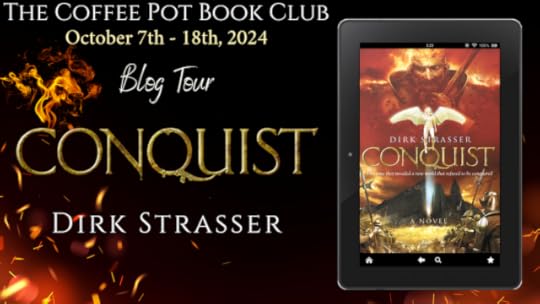
Today for #HistFicThursdays, I am to once again be teaming up with The Coffee Pot Book Club, this time to share an excerpt from Dirk Strasser's fantastic new book Conquist!
First of all, let's meet the book...
Capitán Cristóbal de Varga’s drive for glory and gold in 1538 Peru leads him and his army of conquistadors into a New World that refuses to be conquered. He is a man torn by life-long obsessions and knows this is his last campaign.
What he doesn’t know is that his Incan allies led by the princess Sarpay have their own furtive plans to make sure he never finds the golden city of Vilcabamba. He also doesn’t know that Héctor Valiente, the freed African slave he appointed as his lieutenant, has found a portal that will lead them all into a world that will challenge his deepest beliefs. And what he can’t possibly know is that this world will trap him in a war between two eternal enemies, leading him to question everything he has devoted his life to - his command, his Incan princess, his honor, his God.
In the end, he faces the ultimate dilemma: how is it possible to battle your own obsessions . . . to conquer yourself?
You can buy Conquist via this link.
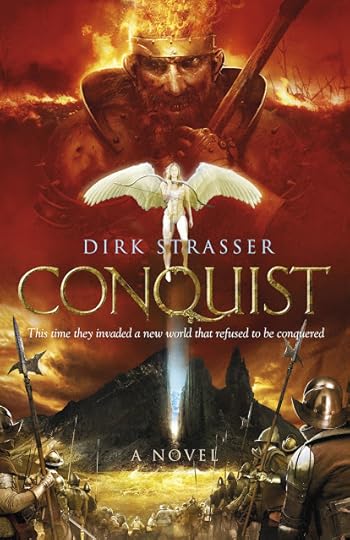
Chapter 4The Honor of the Fathers
Surrounded by snowdrifts from the previous night’s storm, Cristóbal and Diego fought to stand firm against the mountain wind. Cristóbal pushed his crossbow hard against his shoulder and took aim at a herd of alpacas on a far slope. He cherished these moments alone with his clever cousin, free from the burden of command which had grown every day since they had left Machu Picchu.
“You really think I’ll be able to hit one of the alpacas from here?”
Although Diego had some of his cousin’s height, in all other ways he was physically his opposite. Diego was soft where Cristóbal was firm. He stooped where the Capitán stood unflinchingly rigid. His beard grew in wild tangles while Cristóbal’s face defiantly laid every blemish bare.
“The bolt will make the distance,” said Diego. “I can’t speak for your aim.”
Cristóbal smiled and widened his stance. “We both know it’s not my aim that’s the problem.”
“No, it’s usually what you aim at that we need to worry about.” Diego took a deep breath. “Cristóbal, please don’t tell me you’ve asked for her.”
“I like the feel of this new crossbow of yours.”
“Have you forgotten Incan emperors marry their sister? How can you install Huarcay as emperor when you’re obsessed with his sister?”
Cristóbal lowered his crossbow and glared at Diego. Although they had been inseparable since boyhood, tending the horses on his father’s diminishing lands, he often wished his cousin didn’t share his family’s stubborn streak. “Maybe instead of disapproving, you should find yourself a companion among the Incan servants.”
“Do you really need a princess?”
“Spain wouldn’t have an empire without the marriage of Isabella and Ferdinand. Great power comes from great alliances.”
“I can remember our fathers talking about honor above all else. Honra sobre todo. But when did our families ever speak about great alliances?”
“Isn’t that why we stowed away to the New World all those years ago, Diego? To find greatness?” Cristóbal lifted the crossbow to his chin again. “Can we finally put your new invention to the test?”
“Yes, Capitán.”
“Let’s make certain there’s no chance involved.” He raised his nose in line with the bolt. “Do you see the white one…there in the middle of the herd? That’s the one I’m aiming for.”
“The Incas believe the white alpacas are sacred.”
“Don’t worry. After we skin it, the Incas won’t be able to tell the color of its coat.”
Cristóbal welcomed the familiar surge of confidence as he took aim. His breathing steadied to a calm rhythm, his crossbow now part of his arm, the bolt head tingling as if it was his fingertip. Of course, he wasn’t going to miss.
The white alpaca raised its head as if sniffing a sudden wind change. A sharp twang pierced the crisp high-altitude air. The alpaca moved with lightning speed, but the bolt struck it in the throat mid-leap. It collapsed onto a snow drift as the other alpacas scattered in confusion.
Cristóbal turned the weapon around to examine it. “I have the feeling that this crossbow of yours will do something important.”
A clap of thunder echoed in the distance.
“Maybe,” said Diego, “but no crossbow can help us if we can’t find Manco Inca.” They led their horses toward the white alpaca. The snow-crested Andean peaks jutted from the low clouds in the distance, piercing the blue sky. “I hate telling you something else you don’t want to hear, but—”
“Ha, you love nothing better.” Cristóbal removed the bolt from the alpaca’s throat. “I’ll save you the trouble this time. I know the men are getting restless. We need to find Vilcabamba.”“It’s more than restless. I hear things they would never say to your face.”
A sudden snow flurry stung their skin as they slung the animal over Cristóbal’s horse.
“Come, let’s get this alpaca back to camp,” said Cristóbal. “If we approach from the south, the Incas won’t see it’s white.”
***
By the time they had reached the campsite, the mountain peaks had disappeared behind billowing clouds, and it was clear another storm was on the way. The stench always drew Cristóbal back to the reality of his campaign. As usual he gagged. He fought to control his breathing, knowing he only needed to bear it a while and the pungency would fade. A man can grow numb to anything. Smells. Frustration. Even failure.
They had all been stuck on the plateau far too long. A company this size had to keep moving or it would drown in its own excrement. The storms had kept them trapped here for two weeks, and worse, they had no obvious path forward. Many of the soldiers had stopped donning their armor. They played card games, gambled for shares of future fortunes, and traded insults. Melting snow for water wasn’t a fit duty for a conquistador, and only so many hunters were needed each day. Worst of all, since leaving Machu Picchu six months ago, Cristóbal had seen no sign he was looking in the right place for Manco Inca’s hidden city. All he had was Huarcay’s assurances that they were close, while other conquistadors were searching elsewhere.
Lieutenant Rodrigo Benalcázar approached with the three soldiers he always seemed to have in tow, Carlos, Luis and Martín. The wiry lieutenant gave Diego a sideways glance, as if he was the cause of the stink that shrouded the camp. Although there had been no threat since Machu Picchu, Rodrigo was wearing his full armor, including breastplate, gorget, and arm and leg greaves.
Cristóbal asked, “Any news from the patrols, Lieutenant Benalcázar?”
“No, Capitán, but Lieutenant Valiente hasn’t returned yet. Should I send out a search party?” He glanced back at the three soldiers with a half-smile through his thin beard and collapsed cheeks. As always, he was keen to present his fellow lieutenant in the worst possible light.
“That won’t be necessary. He knows where we are.” Cristóbal indicated the alpaca behind him. “Could you get this skinned? And make sure the Incas don’t see it.”
“Why?”
“Diego tells me the white ones are sacred to them.”
“So? Are we now appeasing pagans?”
“No, of course not, but our campaign will falter without Huarcay’s support.”
“You mean it hasn’t faltered already, Capitán?”
Lightning lit up the clouds crowding the nearest mountaintop.
Cristóbal said, “When the storms finally ease, we’ll leave.”
“To where?” A clap of thunder rolled down the slopes.
“Wherever Huarcay directs us. He tells me we’re close to Vilcabamba.”
“Is it time for one of the other Incas to direct us, Capitán?”
Cristóbal stiffened. As usual Rodrigo was trying to test his authority. He was a hard and cunning man who had fought his way to where he was from the slums of Extremadura, the poorest region of Spain. He was the sort of man you wanted on your side in a fight, and who instinctively inspired obedience. “What are you saying, Lieutenant Benalcázar?”
“There are rumors, Capitán. The men talk.”
Were the three soldiers behind the lieutenant smirking? “If the men are wasting their time with gossip, then maybe you should make sure they have extra duties.”
“Yes, Capitán. I’ll see to it.”
Cristóbal dismounted and looked up at the darkening sky as Carlos, Luis and Martín carried the alpaca carcass away. Where was Héctor? This was not like him.
Now, let's meet the author:

Dirk Strasser’s epic fantasy trilogy The Books of Ascension—Zenith, Equinox and Eclipse—was published in German and English, and his short stories have been translated into several European languages. “The Doppelgänger Effect” appeared in the World Fantasy Award-winning anthology Dreaming Down Under. He is the co-editor of Australia’s premier science-fiction and fantasy magazine, Aurealis.
Dirk was born in Germany but has lived most of his life in Australia. He has written a series of best-selling school textbooks, trekked the Inca trail to Machu Picchu and studied Renaissance history. “Conquist” was first published as a short story in the anthology Dreaming Again (HarperCollins). The serialized version of Conquist was a finalist in the Aurealis Awards Best Fantasy Novel category. Dirk’s screenplay version of Conquist won the Wildsound Fantasy/Sci-Fi Festival Best Scene Reading Award and was a featured finalist in the Cinequest Film & Creativity Festival and the Creative World Awards.
You can find the Dirk on these links:
Website - Twitter - Facebook - LinkedIn - Amazon Author Page - Goodreads - Dirk’s Blog
To follow the rest of the tour for Conquist, click on the banner below:
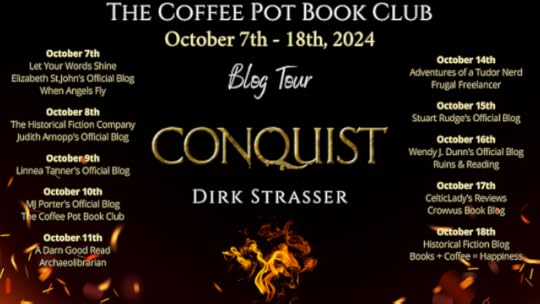
October 10, 2024
#HistFicThursdays - Ghosts: A Brief Timeline
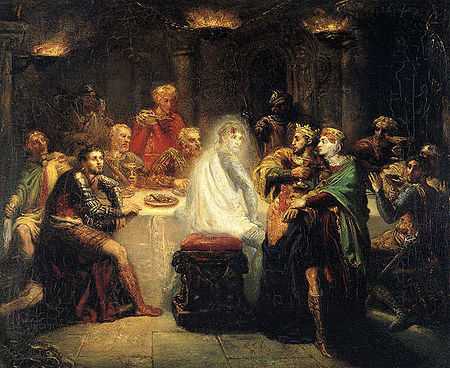 Macbeth Seeing the Ghost of Banquo
Macbeth Seeing the Ghost of Banquoby Théodore Chassériau
Following on from last week, I'm sticking with the topic of the supernatural and looking at the history of ghosts. I've lived in a few haunted houses over the years (you can find some of These Experiences here), and I've found that there are few things which capture a peaked emotion or imagination quick like tales of the paranormal. So, for today's #HistFicThursdays blog, here's a story or two of real ghosts in history... Who knows, perhaps I'll be reading some of your books inspired by them in the not-too-distant future.
According to historians, the oldest portrayal of a ghost is from a Babylonian tablet. As someone who loves studying stones (check out my book about the carved stones of Stempster here), I love the vague promise of this image. According to those in the know, Babylonian ghosts existed because they suffered from a deficiency - in this case: company. Ghosts are exorcised by following the ritual written on the back of the tablet, but the best snippet of all is that the instructions issue a caution: Don't look behind you. Interestingly, this trickles into many myths (such as Orpheus in the Underworld) and right into modern horror films today.As a literary point, one of the most clever, subconscious twists to this is in A Christmas Carol when Scrooge questions not whether Marley was behind him, but whether the spectre had gone ahead.
Interestingly, Mesopotamian ghosts appear to have been sent as warnings.
Unsurprisingly, the Ancient Greeks had a very sophisticated and logical system of ghosts. Their ghosts fitted into one of three category: those not correctly buried; those who died prematurely; those who died in battle. Eidolon were Greek ghosts who were images of an individual - interestingly, these could also exist as ghosts of the living, a little bit like the idea of a doppelganger.
The Romans also seem to have believed in similar sorts of ghosts. One of the most spectacular sightings of a Roman ghost was in a beer cellar in York. A phantom legion was seen walking through the basement at approximately a foot below floor level (where the Roman road would have been). This suggests that ghosts are - at least sometimes - images which are trapped in time rather than the spirits or souls of individuals.
Also, what a great idea for a ghost story looking at a civilisation lost to the ocean or intentionally flooded like in the case of Derwent, now below Ladybower Reservoir. What would a diver see there..?
In the Aztec culture, women who died in childbirth returned as Cihuātēteoh. Those were generally absent from the world, but five times a year they would return to earth and haunt crossroads, hoping to kidnap children. Interestingly, the Aztecs rated these women on an equal footing to men who died in battle, both heroic in their own way.
Crossroads have often been seen as haunted places. In English culture, criminals were often hanged and gibbeted at crossroads as it was believed their ghost would not be able to find its way back.
In Chinese culture, ghosts often inhabited objects. Typically, a spirit form returning to Earth does so for negative or nefarious reasons. Possession is by far the most common form of spirit, many as a result of immoral worldly lives, and this is a theme which has infiltrated into may artistic forms across the world.
As a literary point: Haunted objects were intrinsic to the work of Edgar Allan Poe, often making for some of the greatest - and creepiest - short stories.
There is also a term "Hero among ghosts" which is someone who dies a heroic death, such as warrior.
While apparitions of individuals seem to have been present in ancient cultures, the most famous and recurring ones seem to have started making an appearance a little later. Was this because people compared their stories more? Or perhaps the more multicultural a society became the more acceptance there was of different types of ghosts. Whatever the reason, the middle ages saw a sharp increase of female ghosts who were either falsely or unfairly accused by their husbands. These are often non-engaging spirits. Most European castles seem to be haunted by a lady who was killed on the grounds of adultery. This was perhaps a cautionary tale to everyone that even the upper classes were answerable for such crimes, but it could just as likely be that there was growing sympathy for these women and, by accepting the presence of their ghosts, they became sad and sorry subjects... Just look at Anne Boleyn.
There are many stories of haunted battlefields, sometimes as the battle is re-enacted, sometimes of individuals. On sites of such brutality and death, it can hardly be surprising that this is a case. Battlefields of civil wars across the globe are particularly likely to be haunted, probably because there would have been a deep confusion and heightened emotion at the prospect of brother against brother - again, another great topic for historical fiction writers! In the UK, Edgehill is thought to be one of the most haunted, while Gettysburg wins out in the USA.
Weird fact: The Edgehill Phantoms, first reported in 1643, remain the only ghosts to have been officially recognised by the British Public Records Office.
While science has leapt ahead of the supernatural curve in relation to marshlights, they are nonetheless a worthwhile mention as there remains as many apparitions of this type which are still unexplained. The transient appearance of Will-o'-the-wisps led to a belief that these were spirits without form. While stories abound - usually involving the devil or the fight of good and evil - one belief was that marshlights were babies who were stillborn. They were unable to enter heaven but neither were they condemned to hell. Instead, they had a formless existence and their soul disappears as rapidly as the spirit as they had as a child.
In addition to marshlights, this type of haunting appears to have existed as trapped souls in other locations, including castles and caves. They are always seen in the dark.
Of course, there is no reason why there should be human ghosts without there also being animal ghosts. Throughout history, people have viewed certain animals as omens, such as owls, tigers, or black dogs. But there are also instances of individual animals returning. One of the most famous of these was Guy Gibson's Labrador, who made a surprising appearance on a group photograph years after he'd died. He had also been seen by staff in the officer's mess several times.
And the last one on my list - although there are obviously thousands more out there! - are the ghosts we don't see. There are poltergeist who are formless, there are smells which are trapped in locations and time, there are sounds which are unexplained no matter how hard we try to pass them off as something tangible, and then there are the ones which create a reaction without people even understanding why. "Someone walked over my grave" was included in Jonathan Swift's writings in 1738, but it comes from a much older saying. This speaks of the connection between the living and the dead, and the understanding that the living will one day become the dead, but still connected to the living... A continuous circle!
This seems like a good place to round off as the cycle of ancestors and descendants can be seen as the best example of ghosts, something which has been throughout history and across continents. As writers, we can never overestimate the significance of beliefs in the supernatural. Ghosts exist on many levels and, while the ones listed here are more paranormal, it has not explored the haunting of an individual... that type of ghost also makes for fabulous stories!
October 3, 2024
#HistFicThursdays - The Paranormal and Supernatural - Writing Beyond the Senses
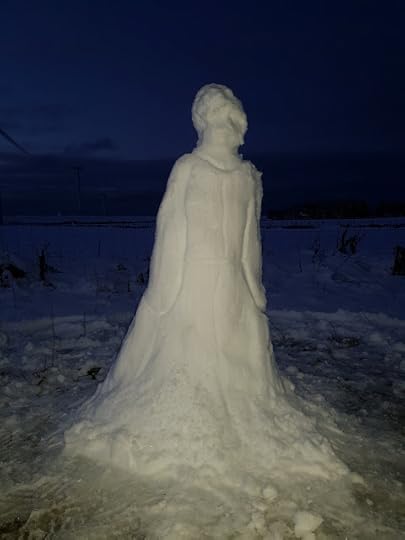
As a writer, you're increasingly told to show don't tell. It's one of those phrases which has infiltrated all lessons from the highest ranked authors to the little primary school child taking their first steps into writing. Ironically, there are now so many clichés in this particular idea that it is now becoming something of a cliché itself!
But one particularly significant area of inspiration and writing when this works at its best is when we are dealing with the supernatural. By its very meaning, the supernatural transcends the laws of nature. It's our job as writers of historical fiction not only to convey that but - and this is a real biggie! - to acknowledge and accept that these beliefs were true.
Belief in these ideas (which, at best, now get you labelled as quirky) was commonplace in history, and you need not look too far back to find them. According to surveys run ten years ago, 34% of people in the UK said they believed in ghosts, and 42% of people in the USA said the same. That level of belief in something beyond or parallel to the norm is still very present.
So, is it plausible to use this in historical fiction? Absolutely! And don't be talked into rebranding it as historical fantasy. If you have a character in Europe during the early Middle Ages, they will have believed so entirely in what the church told them, it will have been wholly true, right to the point that they would buy their way into heaven or light the pyre under anyone who dared to challenge their belief. Thinking beyond the church's teaching was often seen as the influence of the devil, and there was no doubt in anyone's mind that the devil did indeed have horns and a pointy tail.
But it was not just the church's views of things beyond the realm of normality which people believed in. Local areas had their own supernatural happenings. Local ghosts, black dogs, fairies, witches, you name it! And, as far as we as writers are concerned, they were all real. Why? Because they were real to our characters.
So, while Caledon is historical fantasy because it is the supernatural which changes the plot, The Year We Lived is not fantasy because the characters govern their own paths - albeit with their own strong beliefs in superstition and the paranormal. And writing both - or either - is equally as exciting!
What does this have to do with show don't tell? Well, by our definition, the rules of normality and nature cannot apply, so you can't possibly tell someone about it anyway! It would be like colour to a blind person: meaningless. Look for ways around the explanation of the experience. Emotions are great for this! You don't have to go into details about why your character feels a certain way, you only have to convey a connection between the character and your reader. Remember - research in this area is at least as important as research into the clothes/manners/foods/etc of the time, and it will tell you as much (or even more) about your characters.
And don't forget, a supernatural experience is usually a personal one. There are no rights or wrongs in how your character chooses to react.
Crowvus Book Blog
- Virginia Crow's profile
- 128 followers



